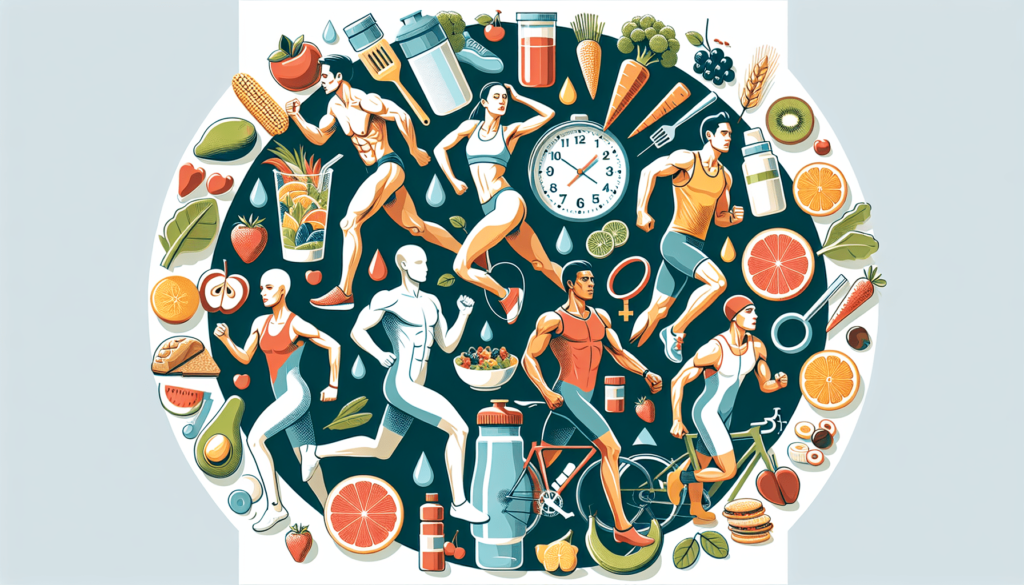If you’re an endurance athlete looking to maximize your performance, then paying attention to your nutrition is crucial. Fueling your body with the right nutrients can make a world of difference in your endurance training and races. From staying hydrated to eating the right balance of carbohydrates, protein, and fats, this article provides essential tips to help you optimize your nutrition and reach your peak performance. So, grab a pen and paper, take notes, and get ready to power up your endurance game with these nutritional tips.

Importance of Proper Nutrition for Endurance Athletes
Proper nutrition is essential for any athlete, but for endurance athletes, it is especially vital. Endurance activities, such as long-distance running, cycling, or swimming, place high demands on the body and require a steady supply of energy. By fueling your body with the right combination of macronutrients and maintaining proper hydration, you can optimize your performance, speed up recovery, and prevent fatigue and injury. In this article, we will explore the importance of macronutrient balance, hydration strategies, and the role of nutrition before, during, and after workouts for endurance athletes.
Macronutrient Balance
Macronutrients, including carbohydrates, proteins, and fats, are the main sources of energy for our bodies. Achieving the right balance of these macronutrients is crucial for endurance athletes to perform at their best. Let’s dive into each macronutrient and understand its role in supporting your athletic performance.
Carbohydrates
Carbohydrates are the primary fuel source for endurance athletes. They provide readily available energy to power your muscles during long, sustained activities. There are two main types of carbohydrates: complex carbohydrates and simple carbohydrates.
Complex Carbohydrates
Complex carbohydrates, such as whole grains, vegetables, and legumes, are rich in fiber and provide a steady release of energy. They are a valuable source of sustained fuel and should make up the majority of your carbohydrate intake. Including foods like brown rice, quinoa, sweet potatoes, and whole wheat pasta in your diet will ensure a constant supply of energy throughout your workouts.
Simple Carbohydrates
Simple carbohydrates, found in fruits, honey, and many processed foods, provide quick bursts of energy. They are easily digested and can be useful for immediate fuel needs during intense training sessions or competitions. However, relying solely on simple carbohydrates can lead to energy crashes and is not recommended for long-duration activities. It’s best to incorporate a balance of both complex and simple carbohydrates into your diet.
Carbohydrate Loading
Carbohydrate loading is a technique used by endurance athletes to maximize their glycogen stores before a long event or race. By increasing carbohydrate intake in the days leading up to the event, athletes can store more glycogen in their muscles, which provides a reserve of fuel during the activity. To successfully carbohydrate load, gradually increase carbohydrate consumption to around 70-80% of your total daily calories for 1-3 days before the event.
Proteins
Proteins are essential for repairing and building muscles, as well as supporting various bodily functions. While carbohydrates are the primary fuel source during endurance activities, protein plays a crucial role in recovery and muscle maintenance. It’s important to consume an adequate amount of protein to support your training and ensure optimal performance.
Complete Proteins
Complete proteins contain all nine essential amino acids required by the body. Sources of complete proteins include animal products like lean meats, poultry, fish, and eggs. These proteins are easily digestible and provide a wide range of amino acids necessary for muscle repair and growth.
Plant-based Proteins
Plant-based proteins, such as beans, lentils, tofu, tempeh, and quinoa, are excellent alternatives for endurance athletes who follow a vegetarian or vegan diet. While plant-based proteins may not contain all essential amino acids on their own, combining different sources can provide a complete protein profile. Including a variety of plant-based protein sources in your meals ensures you receive a diverse range of nutrients and amino acids.
Timing and Quantity
Timing and quantity of protein intake are crucial for endurance athletes. To optimize muscle repair and recovery, aim to consume a protein-rich meal or snack within 30-60 minutes after each workout. The recommended protein intake for endurance athletes is approximately 1.2-2.0 grams of protein per kilogram of body weight per day. Divide your protein intake evenly throughout the day to maintain a steady supply of amino acids for muscle repair and growth.
Fats
Contrary to popular belief, fats are an essential part of a well-rounded endurance athlete’s diet. They provide a concentrated source of energy, protect vital organs, aid in hormone production, and facilitate nutrient absorption. However, not all fats are created equal, and it’s important to choose healthy fats that support your performance and overall health.
Choosing Healthy Fats
Include foods rich in unsaturated fats, such as avocados, nuts, seeds, and olive oil, in your diet. These fats promote heart health and provide a long-lasting source of energy. Including fatty fish like salmon, mackerel, and sardines in your meals will give you the added benefit of omega-3 fatty acids, which have anti-inflammatory properties and support cardiovascular health.
Avoiding Trans Fats
Trans fats, often found in processed and fried foods, are harmful to your health and should be avoided. They raise bad cholesterol levels (LDL) and increase the risk of heart disease. Always check food labels and avoid products that contain hydrogenated oils or partially hydrogenated oils, as these typically indicate the presence of trans fats.
Balancing Omega-3 and Omega-6 Fatty Acids
While omega-3 fatty acids offer numerous health benefits, it’s important to maintain a balance between omega-3 and omega-6 fatty acids. Omega-6 fatty acids, found in vegetable oils and processed foods, can promote inflammation if consumed in excess. Aim for a ratio of 1:1 to 4:1 (omega-6 to omega-3) in your diet by increasing omega-3-rich foods and reducing processed food consumption.
Hydration
Proper hydration is essential for endurance athletes to maintain performance and prevent the risk of dehydration. Water is the most essential fluid for hydration, as it helps regulate body temperature, transport nutrients, and remove waste products. Let’s explore the importance of hydration, the difference between water and sports drinks, and how to determine optimal fluid intake.
Importance of Hydration
As an endurance athlete, staying hydrated is crucial for both performance and overall health. Even mild dehydration can impair your physical and mental performance, leading to fatigue, muscle cramps, and decreased cognitive function. Make it a priority to drink enough fluids before, during, and after your workouts to replenish the water lost through sweat.
Water vs. Sports Drinks
While water is sufficient for most endurance activities, sports drinks can be beneficial during more intense and prolonged workouts. Sports drinks contain electrolytes, such as sodium and potassium, which help replenish the minerals lost through sweat and maintain proper fluid balance. However, be mindful of the added sugars in sports drinks, as excessive consumption may lead to unwanted weight gain and negative health effects. For shorter workouts, water is usually enough to meet your hydration needs.
Optimal Fluid Intake
Determining the optimal fluid intake for endurance athletes can be challenging, as individual needs vary based on factors such as body weight, temperature, humidity, and workout intensity. A simple guideline to follow is to drink enough fluids to minimize weight loss during exercise. Weigh yourself before and after workouts to estimate fluid loss. For every pound lost, consume approximately 16-24 ounces (500-750 ml) of fluid to rehydrate adequately.
Pre-Workout Nutrition
Proper pre-workout nutrition is crucial for endurance athletes to fuel their bodies and optimize performance. The timing, food choices, and portion sizes before a workout can greatly impact your energy levels and avoid discomfort during training. Let’s delve into the key aspects of pre-workout nutrition for endurance athletes.
Balanced Meal Timing
Timing your pre-workout meal properly allows your body to digest and absorb nutrients, ensuring you have enough energy for your workout. As a general guideline, aim to eat a balanced meal containing carbohydrates, proteins, and fats 2-3 hours before your workout. This timeframe allows for optimal digestion and minimizes the risk of stomach discomfort during exercise. If you have less time, opt for a smaller snack or liquid meal that is easier to digest.
Choosing the Right Foods
When selecting pre-workout foods, prioritize easy-to-digest carbohydrates that provide a quick source of energy. Opt for whole grain bread, oatmeal, fruits, or a sports drink. Pair these carbohydrates with a small amount of protein, such as yogurt or a handful of nuts, to help with muscle repair and recovery. Including a small amount of healthy fats, such as nut butter, can provide sustained energy throughout your workout.
Avoiding Heavy or Greasy Meals
Steer clear of heavy, greasy, or high-fiber meals before your workout, as they can cause digestive discomfort and slow down your digestion. These types of meals may take longer to break down, leading to feelings of bloating, lethargy, or even indigestion during your exercise. Stick to lighter, easily digestible foods to ensure you’re properly fueled without any discomfort.

During-Workout Nutrition
For endurance activities lasting longer than 60-90 minutes, proper nutrition during your workout becomes crucial. Consuming the right balance of fluids, carbohydrates, and electrolytes will enhance your performance, delay fatigue, and sustain your energy levels. Let’s discuss the key aspects of during-workout nutrition for endurance athletes.
Hydration Strategies
Maintaining proper hydration during your workout is vital to prevent dehydration and sustain your performance. Aim to drink fluids based on your sweat rate and the duration of your activity. Consuming approximately 4-8 ounces (120-240 ml) of fluid every 15-20 minutes can help replenish the fluids lost through sweat. If possible, use a sports drink that contains electrolytes to replace minerals lost during prolonged exercises.
Carbohydrate and Electrolyte Intake
As your workout progresses, your stored carbohydrate reserves begin to deplete. Consuming carbohydrates during your workout can help maintain your blood sugar levels and provide an additional source of fuel. Opt for easily digestible carbohydrates like energy gels, sports drinks, or dried fruits. Aim for 30-60 grams of carbohydrates per hour, depending on the duration and intensity of your exercise.
Energy Gels and Chews
Energy gels and chews are convenient options for consuming carbohydrates and electrolytes during your workout. They come in small, portable packages, making them easy to carry and consume on the go. Energy gels usually contain a concentrated source of carbohydrates, while chews provide a combination of carbohydrates and electrolytes. Experiment with different brands and flavors to find the ones that work best for you.
Post-Workout Nutrition
After a long and strenuous workout, your body needs proper nutrition to recover, repair damaged tissues, and replenish energy stores. Consuming the right combination of carbohydrates and proteins within the appropriate timeframe can enhance recovery and prepare your body for future workouts. Let’s explore the importance of post-workout nutrition for endurance athletes.
Replenishing Carbohydrate Stores
Refueling your carbohydrate stores, known as glycogen, is a top priority after intense endurance training. Consuming carbohydrates within 30-60 minutes after your workout can optimize glycogen synthesis and recovery. Aim for a combination of complex and simple carbohydrates, such as a banana with whole grain toast or a bowl of oatmeal topped with berries. Including carbohydrates in your post-workout meal or snack will kickstart the replenishment process.
Repairing and Building Muscles
Endurance training places stress on your muscles, and consuming an adequate amount of protein post-workout is essential for muscle repair and growth. Including a source of high-quality protein in your post-workout meal or snack within 30-60 minutes will provide the necessary amino acids for optimal recovery. Opt for lean meats, fish, eggs, dairy products, or plant-based protein sources like tofu or lentils to support muscle repair and growth.
Importance of Protein Intake
Endurance athletes typically have higher protein needs due to the stress placed on their muscles during intense training. Aim for approximately 20-30 grams of protein in your post-workout meal or snack. This can easily be achieved by including a palm-sized portion of protein-rich foods like chicken, fish, Greek yogurt, or a protein shake in your recovery routine. Dividing your protein intake throughout the day will ensure a steady supply of amino acids for muscle repair and adaptation.
Supplements for Endurance Athletes
While a well-rounded diet should provide you with most of the necessary nutrients, some endurance athletes may benefit from incorporating supplements to support their training and performance. Let’s explore a few common supplements used by endurance athletes.
Energy Gels and Bars
Energy gels and bars are convenient sources of carbohydrates and electrolytes during long, intense workouts or races. They often contain a concentrated blend of simple carbohydrates that can provide a quick source of energy. However, it’s important to test these products during training to ensure they agree with your stomach and do not cause any gastrointestinal distress.
Electrolyte Supplements
Electrolyte supplements, in the form of capsules or powders, can be used to replenish minerals lost through sweat during prolonged endurance activities. Sodium, potassium, and magnesium are among the key electrolytes that need to be replaced to maintain proper fluid balance and prevent muscle cramps. While electrolyte supplements can be beneficial for athletes performing in extreme conditions, most endurance athletes can meet their needs through a well-balanced diet and sports drinks.
Protein Powders
Protein powders can be a convenient way to meet your protein needs, especially for athletes who struggle to consume enough protein through whole foods alone. Whey protein, derived from milk, is a popular option due to its high bioavailability and complete amino acid profile. Vegan and plant-based protein powders, such as pea, hemp, or rice protein, are also available for athletes following a vegetarian or vegan diet. However, it’s important to remember that supplements should never replace a well-rounded diet and should be used to supplement, not substitute, your nutrition.
In conclusion, proper nutrition plays a crucial role in optimizing performance and supporting the overall health of endurance athletes. Achieving a proper macronutrient balance, staying properly hydrated, and consuming the right nutrients before, during, and after workouts are essential for fueling your body and ensuring quick recovery. Remember to listen to your body, experiment with different foods and strategies, and consult with a registered dietitian or sports nutritionist to develop a personalized nutrition plan that meets your specific needs and goals. With the right nutrition, you can excel in your endurance pursuits and reach your full athletic potential.

